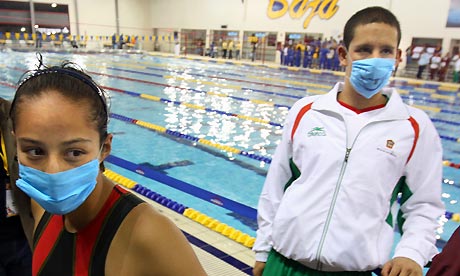
Missed out on Matthew Williamson for H&M? Never mind. It's over anyway. Hot from Mexico - and now in every other town worldwide - surgical masks are this week's latest fashion accessory. At least, that's the verdict from politicians and most of the medical establishment, who think they're about as much use in avoiding swine flu as wearing a pair of statement earrings.
"The scientific evidence does not support the general wearing of face masks by those who are not ill while going about their daily business," says Alan Johnson, secretary of state for health.
Dr John McConnell, editor of the Lancet Infectious Diseases, agrees. "Masks are probably more useful for people with symptoms to prevent them spreading infection," he says. "In any case, masks need to be changed daily to be effective."
One dissenting voice is Andrew Easton, professor of virology at the University of Warwick, who argues that the correct mask can potentially reduce risk. The key word here is correct. "Most paper masks are worse than useless," says Dr Ron Cutler, deputy director of biomedical sciences at Queen Mary, University of London. "To be effective, they need to conform to CDC (Centre for Disease Control) standards. The best ones are sculpted to the face and are expensive, but even then they are of limited value. The virus is transmitted on water-born droplets from coughs and sneezes, and while the mask may prevent you getting infected from direct contact, it can't stop it landing anywhere else. So you can pick it up on your hands without knowing. Your best bet is to steer clear of anyone coughing and sneezing and to wash your hands frequently."
Of course, if you're in a hypochondriacal panic, you'll probably think that anything is better than nothing. And they've got to be more effective than hiding under the kitchen table. Which, if you remember, was the government's advice for surviving a nuclear attack.

